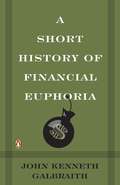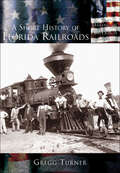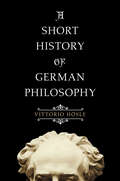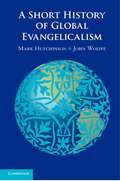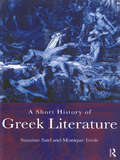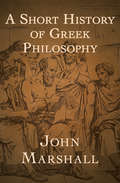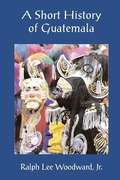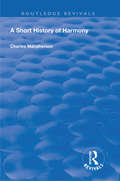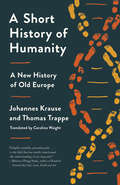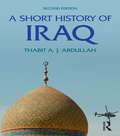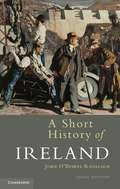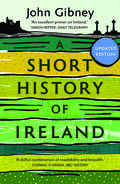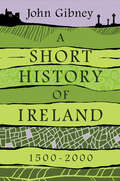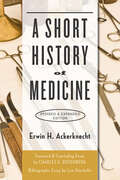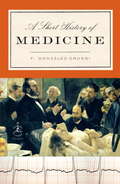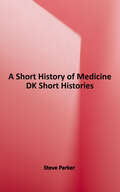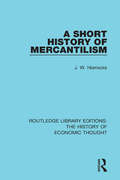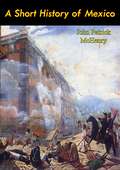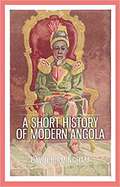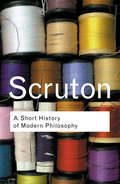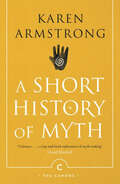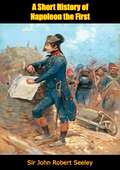- Table View
- List View
A Short History of Financial Euphoria
by John Kenneth GalbraithThe world-renowned economist offers "dourly irreverent analyses of financial debacle from the tulip craze of the seventeenth century to the recent plague of junk bonds. "-The Atlantic. .
A Short History of Financial Euphoria
by John Kenneth GalbraithThe world-renowned economist offers "dourly irreverent analyses of financial debacle from the tulip craze of the seventeenth century to the recent plague of junk bonds."-The Atlantic.
A Short History of Florida Railroads (Making of America)
by Gregg TurnerFlorida's railroad heritage began in the 1830s amidst Native American upheaval and territorial colonization. Surpassing waterways as the primary mode of transport, the "Iron Horse" linked practically every town and city, carried tourists and locals, and ably conveyed the wealth of Florida's mines, factories, forests, groves, and farms. Nearly 175 years later, railroads still remain a dependable source of transport within the Sunshine State.
A Short History of German Philosophy
by Steven Rendall Vittorio HösleThis concise but comprehensive book provides an original history of German-language philosophy from the Middle Ages to today. In an accessible narrative that explains complex ideas in clear language, Vittorio Hösle traces the evolution of German philosophy and describes its central influence on other aspects of German culture, including literature, politics, and science. Starting with the medieval mystic Meister Eckhart, the book addresses the philosophical changes brought about by Luther's Reformation, and then presents a detailed account of the classical age of German philosophy, including the work of Leibniz and Kant; the rise of a new form of humanities in Lessing, Hamann, Herder, and Schiller; the early Romantics; and the Idealists Fichte, Schelling, and Hegel. The following chapters investigate the collapse of the German synthesis in Schopenhauer, Feuerbach, Marx, and Nietzsche. Turning to the twentieth century, the book explores the rise of analytical philosophy in Frege and the Vienna and Berlin circles; the foundation of the historical sciences in Neo-Kantianism and Dilthey; Husserl's phenomenology and its radical alteration by Heidegger; the Nazi philosophers Gehlen and Schmitt; and the main West German philosophers, including Gadamer, Jonas, and those of the two Frankfurt schools. Arguing that there was a distinctive German philosophical tradition from the mid-eighteenth century to the mid-twentieth century, the book closes by examining why that tradition largely ended in the decades after World War II.A philosophical history remarkable for its scope, brevity, and lucidity, this is an invaluable book for students of philosophy and anyone interested in German intellectual and cultural history.
A Short History of Global Evangelicalism
by John Wolffe Mark HutchinsonThis book offers an authoritative overview of the history of evangelicalism as a global movement, from its origins in Europe and North America in the first half of the eighteenth century to its present-day dynamic growth in Africa, Asia, Latin America and Oceania. Starting with a definition of the movement within the context of the history of Protestantism, it follows the history of evangelicalism from its early North Atlantic revivals to the great expansion in the Victorian era, through to its fracturing and reorientation in response to the stresses of modernity and total war in the late nineteenth and early twentieth centuries. It describes the movement's indigenization and expansion toward becoming a multicentered and diverse movement at home in the non-Western world that nevertheless retains continuity with its historic roots. The book concludes with an analysis of contemporary worldwide evangelicalism's current trajectory and the movement's adaptability to changing historical and geographical circumstances.
A Short History of Greek Literature
by Suzanne Said Monique TredeA Short History of Greek Literature provides a concise yet comprehensive survey of Greek literature - from Christian authors - over twelve centuries, from Homer's epics to the rich range of authors surviving from the imperial period up to Justinian. The book is divided into three parts. The first part is devoted to the extraordinary creativity of the archaic and classical age, when the major literary genres - epic, lyric, tragedy, comedy, history, oratory and philosophy - were invented and flourished. The second part covers the Hellenistic period, and the third covers the High Empire and Late Antiquity. At that tine the masters of the previous age were elevated to the rank of 'classics'. The works of the imperial period are replete with literary allusions, yet full of references to contemporary reality.
A Short History of Greek Philosophy
by John MarshallAn overview of the works that form the foundation of Western philosophy The writings of Socrates, Plato, and Aristotle have resonated through the millennia and continue to influence the lives of people today. In A Short History of Greek Philosophy, renowned British classicist John Marshall provides a thorough yet engaging account of the seminal philosophical movements of ancient Greece, from the Sophists to the Sceptics to the Stoics. For readers looking to dip their toes into the vast ocean of Western philosophy, Marshall&’s history provides the perfect springboard. This ebook has been professionally proofread to ensure accuracy and readability on all devices.
A Short History of Guatemala
by Jr. Ralph Lee WoodwardThe exciting history of Guatemala from its ancient Maya heritage to the present. Based on nearly a half-century of research on the history of this Central American republic, the work highlights the political, economic,and social evolution of Guatemala, with particular emphasis on the nineteenth and twentieth centuries.
A Short History of Harmony: Numerous Musical Illustrations (Routledge Revivals)
by Charles MacphersonPublished in 1944, this book considers musical theory and music history to create a short but comprehensive guide to the history of harmony and thus a discourse on what we understand harmony to be in the modern era. Referencing composers such as Beethoven and his contemporaries, the book is illustrated throughout with visual aids.
A Short History of Humanity: A New History of Old Europe
by Johannes Krause Thomas Trappe&“A highly readable, personal guide to the twists and turns in unravelling ancient DNA: Krause and Trappe expertly recount the story of archaeogenetics to reveal how this new field has utterly transformed understanding of our deep past.&”—Rebecca Wragg Sykes, author of Kindred: Neanderthal Life, Love, Death and ArtJohannes Krause is the director of the Max Planck Institute for Evolutionary Anthropology and a brilliant pioneer in the field of archaeogenetics—archaeology augmented by DNA sequencing technology—which has allowed scientists to reconstruct human history reaching back hundreds of thousands of years before recorded time. In this surprising account, Krause and journalist Thomas Trappe rewrite a fascinating chapter of this history, the peopling of Europe, that takes us from the Neanderthals and Denisovans to the present. We know now that a wave of farmers from Anatolia migrated into Europe 8,000 years ago, essentially displacing the dark-skinned, blue-eyed hunter-gatherers who preceded them. This Anatolian farmer DNA is one of the core genetic components of people with contemporary European ancestry. Archaeogenetics has also revealed that indigenous North and South Americans, though long thought to have been East Asian, also share DNA with contemporary Europeans. Krause and Trappe vividly introduce us to the prehistoric cultures of the ancient Europeans: the Aurignacians, innovative artisans who carved flutes and animal and human forms from bird bones more than 40,000 years ago; the Varna, who buried their loved ones with gold long before the Pharaohs of Egypt; and the Gravettians, big-game hunters who were Europe&’s most successful early settlers until they perished in the ice age. Genetics has earned a reputation for smuggling racist ideologies into science, but cutting-edge science makes nonsense of eugenics and &“pure&” bloodlines. Immigration and genetic exchanges have always defined our species; who we are is a question of culture, not biological inheritance. This revelatory book offers us an entirely new way to understand ourselves, both past and present.
A Short History of Iraq
by Thabit AbdullahThis accessible guide has been fully updated to take into account the Iraq War and subsequent developments, whilst retaining its character as a non-partisan and approachable text for students and interested readers alike.The twentieth century witnessed the transformation of the area known currently as Iraq from a backward region of the Ottoman Empire, to one of the most important and dynamic states in the Middle East. The rise of modern Iraq has its roots in the second half of the nineteenth century when Ottoman reforms led to gradual state modernization and increasing integration in the World Economy. British control after World War I was one of the determining factors in the establishment of the current borders of the country and the nature of its subsequent national identity. The other important factor was the highly heterogeneous nature of Iraqi society being divided along tribal, ethnic, religious, and sectarian lines. This book focuses on the interaction between the old and the new, or between continuity and change, as it is manifested in the nature of social development, nation-building, the state and the political opposition.An entirely new chapter focusing on the recent conflict has been added, and will contain sections on:The new chapter will have the following sections:The Question of American Intervention Invasion and the Fall of Saddam Looting & the Collapse of the Central State The Provisional Authority's Reforms The Nature of the Resistance Iraq's New Political Reality Elections and the Rise of Sectarian Parties Social-Economic Transformations The Challenge of the Future.
A Short History of Ireland
by John O'Beirne RanelaghThis third edition of John O'Beirne Ranelagh's classic history of Ireland incorporates contemporary political and economic events as well as the latest archaeological and DNA discoveries. Comprehensively revised and updated throughout, it considers Irish history from the earliest times through the Celts, Cromwell, plantations, famine, Independence, the Omagh bomb, peace initiatives, and financial collapse. It profiles the key players in Irish history from Diarmuid MacMurrough to Gerry Adams and casts new light on the events, North and South, that have shaped Ireland today. Ireland's place in the modern world and its relationship with Britain, the USA and Europe is also examined with a fresh and original eye. Worldwide interest in Ireland continues to increase, but whereas it once focused on violence in Northern Ireland, the tumultuous financial events in the South have opened fresh debates and drawn fresh interest. This is a new history for a new era.
A Short History of Ireland
by Sean McmahonA Short History of Ireland is a readable and comprehensive history of Ireland which provides a perfect introduction for someone seeking to learn more about the fascinating country. It is concise and even-handed. It gives the history of Ireland since the earliest times right up to the autumn of 1996 and the end of the first year of peace in Northern Ireland. The heroes and villains are here, the former perhaps not so heroic, the others less evil than tradition has painted them. Based on up-to-date research, it covers fights and famine, country and town, Protestants and Catholics, Rome Rule and Home Rule, church and state, and includes a handy chronology of Irish history.
A Short History of Ireland, 1500-2000
by John GibneyA brisk, concise, and readable overview of Irish history from the Protestant Reformation to the dawn of the twenty-first century Five centuries of Irish history are explored in this informative and accessible volume. John Gibney proceeds from the beginning of Ireland&’s modern period and continues through to virtually the present day, offering an integrated overview of the island nation&’s cultural, political, and socioeconomic history. This succinct, scholarly study covers important historical events, including the Cromwellian conquest and settlement, the Great Famine, and the struggle for Irish independence. Gibney's book explores major themes such as Ireland&’s often contentious relationship with Britain, its place within the British Empire, the impact of the Protestant Reformation, the ongoing religious tensions it inspired, and the global reach of the Irish diaspora. This unique, wide-ranging work assimilates the most recent scholarship on a wide range of historical controversies, making it an essential addition to the library of any student of Irish studies.
A Short History of Ireland, 1500–2000
by John GibneyA brisk, concise, and readable overview of Irish history from the Protestant Reformation to the dawn of the twenty-first century. Five centuries of Irish history are explored in this informative and accessible volume. Beginning with Ireland&’s modern period at the dawn of the sixteenth century, John Gibney continues through to virtually the present day, offering an integrated overview of the island nation&’s cultural, political, and socioeconomic evolution. This succinct, scholarly study covers important historical events, including the Cromwellian conquest and settlement, the Great Famine, and the struggle for Irish independence. Along the way, it explores major themes such as Ireland&’s often contentious relationship with Britain, the impact of the Protestant Reformation, the ongoing religious tensions it inspired, and the global reach of the Irish diaspora. This unique, wide-ranging work assimilates the most recent scholarship on a wide range of historical controversies, making it an essential addition to the library of any student of Irish studies.
A Short History of Medicine
by Erwin H. AckerknechtA bestselling history of medicine, enriched with a new foreword, concluding essay, and bibliographic essay.Erwin H. Ackerknecht’s A Short History of Medicine is a concise narrative, long appreciated by students in the history of medicine, medical students, historians, and medical professionals as well as all those seeking to understand the history of medicine.Covering the broad sweep of discoveries from parasitic worms to bacilli and x-rays, and highlighting physicians and scientists from Hippocrates and Galen to Pasteur, Koch, and Roentgen, Ackerknecht narrates Western and Eastern civilization’s work at identifying and curing disease. He follows these discoveries from the library to the bedside, hospital, and laboratory, illuminating how basic biological sciences interacted with clinical practice over time. But his story is more than one of laudable scientific and therapeutic achievement. Ackerknecht also points toward the social, ecological, economic, and political conditions that shape the incidence of disease. Improvements in health, Ackerknecht argues, depend on more than laboratory knowledge: they also require that we improve the lives of ordinary men and women by altering social conditions such as poverty and hunger.This revised and expanded edition includes a new foreword and concluding biographical essay by Charles E. Rosenberg, Ackerknecht’s former student and a distinguished historian of medicine. A new bibliographic essay by Lisa Haushofer explores recent scholarship in the history of medicine.
A Short History of Medicine
by Frank Gonzalez-CrussiIn this lively, learned, and wholly engrossing volume, F. González-Crussi presents a brief yet authoritative five-hundred-year history of the science, the philosophy, and the controversies of modern medicine. While this illuminating work mainly explores Western medicine over the past five centuries, González-Crussi also describes how modern medicine's roots extend to both Greco-Roman antiquity and Eastern medical traditions. Covered here in engaging detail are the birth of anatomy and the practice of dissections; the transformation of surgery from a gruesome art to a sophisticated medical specialty; a short history of infectious diseases; the evolution of the diagnostic process; advances in obstetrics and anesthesia; and modern psychiatric therapies and the challenges facing organized medicine today. González-Crussi's approach to these and other topics stems from his professed belief that the history of medicine isn't just a continuum of scientific achievement but is deeply influenced by the personalities of the men and women who made or implemented these breakthroughs. And, as we learn, this field's greatest practitioners were, like the rest of us, human beings with flaws, weaknesses, and limitations-including some who were scoundrels.Insightful, informed, and at times controversial in its conclusions, A Short History of Medicine offers an exceptional introduction to the major and many minor facets of its subject. Written by a renowned author and educator, this book gives us the very essence of humankind's search to mitigate suffering, save lives, and unearth the mysteries of the human animal. Praise for F. González-Crussi"What Oliver Sacks does for the mind, González-Crussi [does] for the eye in this captivating set of philosophical meditations on the relationship between the viewer and the viewed."-Publishers Weekly, on On Seeing"[González-Crussi fuses] science, literature, and personal history into highly civilized artifacts."-The Washington Post, on There Is a World ElsewhereFrom the Hardcover edition.
A Short History of Medicine (Dk Short Histories Ser.)
by Steve ParkerImmerse yourself in the history of medicine – a colorful story of skill, serendipity, trial and error, moments of genius, and dogged determination. From traditional Chinese medicine to today’s sophisticated gene therapies and robotic surgery, A Short History of Medicine combines riveting storytelling and beautiful images, historical accounts, and lucid explanations, to illuminate the story of medicine through time. Witness early, bloody, anesthetic-free operations; see the first crude surgical instruments; trace the mapping of the circulatory system; follow the painstaking detective work that led to the decoding of the human genome; and understand the role that potions, cures, therapies, herbal medicines, and drugs have played in the human quest to tame and conquer disease, injury, and death. Dive deep into this magnificent medicine book to discover: - Vivid, compelling, and informative reads written in an engaging and colorful style - Excerpts from documents, diaries, and notebooks offer fascinating eyewitness accounts. - Charts and contextualizes the great milestones of medical history. A Short History of Medicine is a fascinating illustrated history and tale of drama and discovery that celebrates the milestones of medical history across generations and cultures. From eradicating smallpox to the early anesthetics, the very first transplants to the genetic code, this groundbreaking guide to the history of medicine has something for everyone to explore, learn, and discover. Ideal for adults and young adults alike, whether you have a keen interest in medicine, science or social history, this all-encompassing medicine book is sure to quench your thirst for knowledge!
A Short History of Mercantilism (Routledge Library Editions: The History of Economic Thought)
by J. W. HorrocksThe purpose of this volume, first published in 1925, is to provide the historical account of the regime whereby the State, in different countries, has sought to control economic life in the interests of political and national strength and independence. This study explores the history of the Mercantile System, or Mercantilism, in different nations. It also examines the methods adopted by the State for the promotion and regulation of agriculture, industry and commerce. This title will be of interest to students of economics.
A Short History of Mexico
by John Patrick McHenryIn this concise, readable account, the history of one of the Western Hemisphere’s most important countries is recounted, from the first recorded appearance of early man around 10,000 B.C. down to the present day. Through the pages of this book move the men, famous and infamous, who have Mexican history; Montezuma and Cortes; the Spanish viceroys whose downfall began when the priest Hidalgo issues his famous “Cry of Dolores”; the Emperor Agustin de Iturbide, first ruler of an independent Mexico; General Santa Anna, who fought and lost the Texas Revolution and the Mexican War; the ill-fated Emperor Maximilian and Benito Juarez, who overthrew him; Porfirio Diaz and Francisco Madero; Huerta, Pancho Villa, Carranza, and Zapata, who were involved in the troubles of the early decades of this century; and the president since 1920; among them, Obregon, Calles, Cardenas, Aleman, and the present incumbent, Lopez Mateos.
A Short History of Modern Angola
by David BirminghamThis history by celebrated Africanist David Birmingham begins in 1820 with the Portuguese attempt to create a third, African, empire after the virtual loss of Asia and America. In the nineteenth century the most valuable resource extracted from Angola was agricultural labor, first as privately owned slaves and later as conscript workers. The colony was managed by a few marine officers, by several hundred white political convicts, and by a couple of thousand black Angolans who had adopted Portuguese language and culture. The hub was the harbor city of Luanda which grew in the twentieth century to be a dynamic metropolis of several million people. The export of labor was gradually replaced when an agrarian revolution enabled white Portuguese immigrants to drive black Angolan laborers to produce sugar cane, cotton, maize and above all coffee. <p><p> During the twentieth century Congo copper supplemented this wealth, by gem-quality diamonds, and by offshore oil. Although much of the countryside retained its dollar-a-day peasant economy, new wealth generated conflict which pitted white against black, north against south, coast against highland, American allies against Russian allies. The generation of warfare finally ended in 2002 when national reconstruction could begin on Portuguese colonial foundations.
A Short History of Modern Philosophy: From Descartes to Wittgenstein (Routledge Classics)
by Roger ScrutonDiscover for yourself the pleasures of philosophy! Written both for the seasoned student of philosophy as well as the general reader, the renowned writer Roger Scruton provides a survey of modern philosophy. Always engaging, Scruton takes us on a fascinating tour of the subject, from founding father Descartes to the most important and famous philosopher of the twentieth century, Ludwig Wittgenstein. He identifies all the principal figures as well as outlines of the main intellectual preoccupations that have informed western philosophy. Painting a portrait of modern philosophy that is vivid and animated, Scruton introduces us to some of the greatest philosophical problems invented in this period and pursued ever since. Including material on recent debates, A Short History of Modern Philosophy is already established as the classic introduction. Read it and find out why.
A Short History of Music (Fourth American Edition, Revised)
by Alfred EinsteinThis book covers considers such topics as: primitive music--what was it? how do we know anything about it? music of the middle ages, music of the renaissance, instrumental music through the ages, opera--Latin America is included in this discussion, chamber music--did you know it was popular in the 1920s? Though sometimes technical, this volume is easy to read.
A Short History of Myth
by Karen ArmstrongAs long as we have been human, we have been mythmakers. In A Short History of Myth, Karen Armstrong holds up the mirror of mythology to show us the history of ourselves, and embarks on a journey that begins at a Neanderthal graveside and ends buried in the heart of the modern novel. Surprising, powerful and profound, A Short History of Myth examines the world's most ancient art form - the making and telling of stories - and why we still need it.
A Short History of Napoleon the First
by Sir John Robert SeeleyThere have been many biographies of the Emperor Napoleon over the years and in many languages, however most tend to be either overly laudatory, mostly those written in French, or caustically negative, mostly those written in English. Thankfully this work suffers neither polarity of opinion, sticking to historical fact, rigorous analysis and an even handed portrayal of the subject, without any undue distortion from the realities of the era.Professor Seeley’s biography grew, as he says himself in his preface, out of an impossible task to provide a shortened biographical sketch of the Encyclopaedia Britannica. Unsatisfied that so great a subject could be adequately be dealt with in such a format, he penned his excellent short work on Napoleon.Free from vitriol the book sets a standard that few modern works can be said to have achieved.
